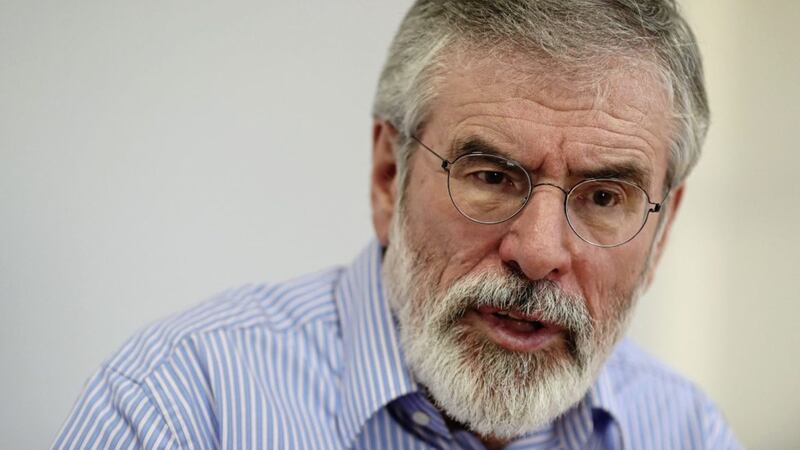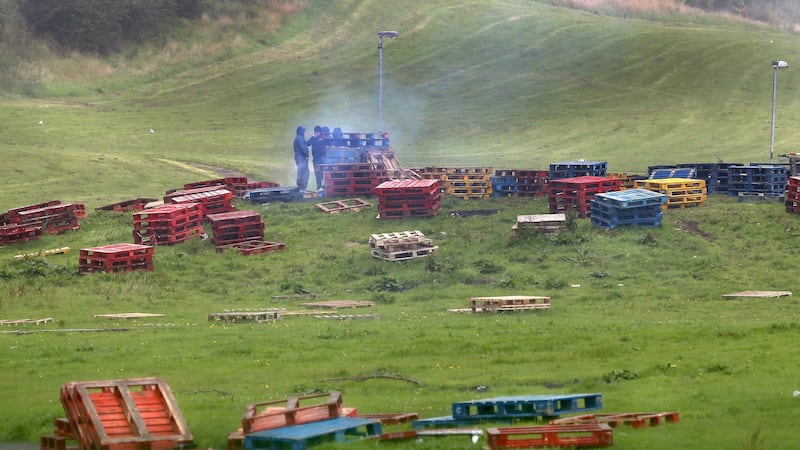GERRY Adams should not be 'rewarded' with a US visa before he publicly renounced violence, the British Ambassador to Washington claimed, according to declassified files.
US president Bill Clinton's decision to grant a visa to the Sinn Féin leader in 1994 - months before the IRA ceasefire - led to strained relationships between his administration and the British government.
The row began when the US's National Committee on American Foreign Policy invited Mr Adams, as well as SDLP leader John Hume and DUP leader Ian Paisley, to a conference in New York.
In a note to Secretary of State Sir Patrick Mayhew, senior Stormont official David Fell said Mr Adams had publicly stated he was seeking a US visa to attend the conference.
Mr Fell said the US Consul-General in Belfast, Val Martinez, told him the US administration was "divided" on whether to grant the request and if it was "sensible to try and give Adams help in selling the (1993 Downing Street) Declaration to the 'hard men in the Provisional IRA'".
On January 15, the British Ambassador to Washington, Sir Robin Renwick, told the Northern Ireland Office that four US senators - Ted Kennedy, Daniel Moynihan, John Kerry and Christopher Dodd - had written to President Clinton to push for the visa to be granted.
The note said the senators were "now hearing that there was a split within the IRA and that obtaining a visa to visit the USA might help Adams win support for his moderate position".
Sir Robin told the NIO that he had made it clear to Senator Kennedy's staff that Mr Adams could only join the political process if the IRA renounced violence.
He said he had told them "it was wrong in principle and wrong tactically to reward Adams before he had taken that step" and that by granting the visa republicans "would only be encouraged to prevaricate while the killing continued".
In a further note to London, Sir Robin said the US State Department, FBI and Justice Department were opposed to granting the visa but the White House may be influenced by the four senators and that fact that Taoiseach Albert Reynolds "was raising no objection".
Prime Minister John Major's private secretary, Roderic Lyne, later told Sir Robin he informed US national security adviser Tony Lake's secretary "that private indications suggested strongly that the Provisionals had decided not to accept the Joint Declaration as it stood and were deliberately stringing us and the Irish government along in the hope of obtaining concessions – hence their call for 'clarification'".
"I added that Sinn Féin was likely to increase the level of violence," Mr Lyne said. "It would surely be embarrassing for the Americans if they let Adams in, only to find IRA violence was increasing."
On January 22, Mr Lake told Mr Lyne a visa would be granted if Mr Adams stated publicly that he "personally renounced violence and urged all parties to the conflict to do so" and if Sinn Féin and the IRA were prepared to take part in serious peace talks.
Mr Lyne told a senior NIO official that Mr Adams "would have no difficulty in putting his hand on his heart and declaring that he was a man of peace" and said he feared the British government was losing the PR battle.
Sir Patrick met the US Ambassador to Britain, Ray Seitz, in London on January 25 to lodge his objection to the visa.
However, that final intervention failed and the visa was granted on January 28.
Read More
- UVF 'had secret talks with IRA which discussed federal Ireland'
- John Hume concerned by release of republican prisoners from Portlaoise after IRA ceasefire
- Bill Clinton was 'more forthcoming' to nationalists than British wanted
Read More
- Gerry Adams was 'dispensable' and 'no Mandela', Ken Maginnis told Bill Clinton adviser
- Unionists 'felt nationalists had benefited from IRA violence'
- Withdrawal of funding from Irish language group 'sparked huge row'
Read More
- Row over planned restoration of Co Armagh birthplace of Orange Order
- Orange Order berated Sir Patrick Mayhew over 'cannibals' remark
- Ian Paisley Jnr 'wanted Stormont government which could negotiate with Republic'
Read More
- Mary Robinson's 1993 meeting with Gerry Adams 'angered British government'
- Records reveal British criticism of Republic's response to Gibraltar deaths
Read More
- Thatcher 'accused Irish government of doing nothing' over suspected IRA priest
- Irish government queried bulk postal discount for Sinn Féin over IRA funding fears
- MPs demanded date to withdraw from Ireland after murders of British soldiers
Read More
- Secretary of state Tom King walked out of meeting after row with SDLP over devolution
- Margaret Thatcher said Garda was 'not a highly professional police force'
- Farm security gates at Irish border sparked allegations of discrimination against Catholics






